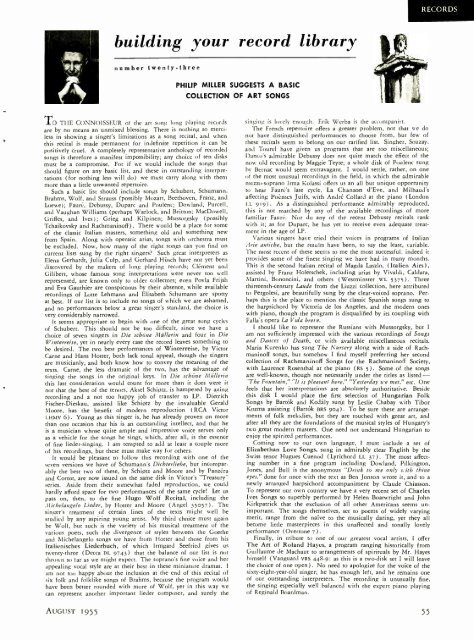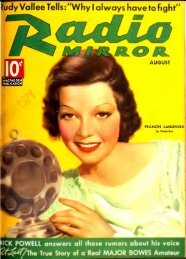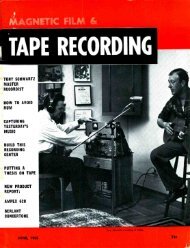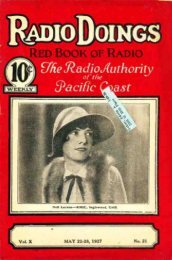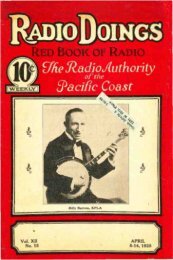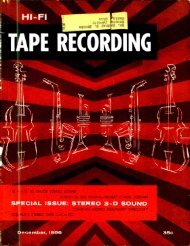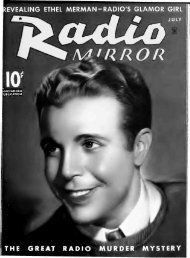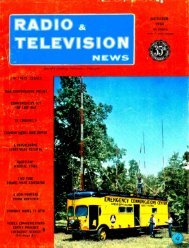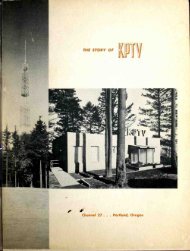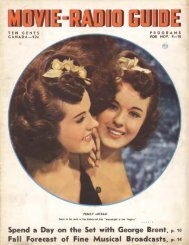Aug - AmericanRadioHistory.Com
Aug - AmericanRadioHistory.Com
Aug - AmericanRadioHistory.Com
You also want an ePaper? Increase the reach of your titles
YUMPU automatically turns print PDFs into web optimized ePapers that Google loves.
l<br />
building<br />
your record library<br />
number twenty -three<br />
PHILIP MILLER SUGGESTS A BASIC<br />
COLLECTION OF ART SONGS<br />
TO THE CONNOISSEUR of the art song long playing records<br />
are by no means an unmixed blessing. There is nothing so merciless<br />
in showing a singer's limitations as a song recital, and when<br />
this recital is made permanent for indefinite repetition it can be<br />
positively cruel. A completely representative anthology of recorded<br />
songs is therefore a manifest impossibility; any choice of ten disks<br />
must be a compromise. For if we would include the songs that<br />
should figure on any basic list, and these in outstanding interpretations<br />
(for nothing less will do) we must carry along with them<br />
more than a little unwanted repertoire.<br />
Such a basic list should include songs by Schubert, Schumann,<br />
Brahms, Wolf, and Strauss (possibly Mozart, Beethoven, Franz, and<br />
Loewe); Faure, Debussy, Duparc and Poulenc; Dowland, Purcell,<br />
and Vaughan Williams (perhaps Warlock, and Britton; MacDowell,<br />
Griffes, and Ives); Grieg and Kilpinen; Mussorgsky (possibly<br />
Tchaikovsky and Rachmaninoff). There would be a place for some<br />
of the classic Italian masters, something old and something new<br />
from Spain. Along with operatic arias, songs with orchestra must<br />
be excluded. Now, how many of the right songs can you find on<br />
current lists sung by the right singers? Such great interpreters as<br />
Elena Gerhardt, Julia Culp, and Gerhard Hüsch have not yet been<br />
discovered by the makers of long playing records; Clément and<br />
Gilibert, whose famous song interpretations were never too well<br />
represented, are known only to older collectors; even Povla Frijsh<br />
and Eva Gauthier are conspicuous by their absence, while available<br />
recordings of Lotte Lehmann and Elisabeth Schumann are spotty<br />
at best. If our list is to include no songs of which we are ashamed,<br />
and no performances below a great singer's standard, the choice is<br />
very considerably narrowed.<br />
It seems appropriate to begin with one of the great song cycles<br />
of Schubert. This should not be too difficult, since we have a<br />
choice of seven singers in Die schöne Müllerin and four in Die<br />
Winterreise, yet in nearly every case the record leaves something to<br />
be desired. The two best performances of Winterreise, by Victor<br />
Carne and Hans Hotter, both lack tonal appeal, though the singers<br />
are musicianly, and both know how to convey the meaning of the<br />
texts. Carne, the less dramatic of the two, has the advantage of<br />
singing the songs in the original keys. In Die schöne Müllerin<br />
this last consideration would count for more than it does were it<br />
not that the best of the tenors, Aksel Schi¢tz, is hampered by aging<br />
recording and a not too happy job of transfer to LP. Dietrich<br />
Fischer -Dieskau, assisted like Schi¢tz by the invaluable Gerald<br />
Moore, has the benefit of modern reproduction (RCA Victor<br />
LHMV 6). Young as this singer is, he has already proven on more<br />
than one occasion that his is an outstanding intellect, and that he<br />
is a musician whose quite ample and impressive voice serves only<br />
as a vehicle for the songs he sings, which, after all, is the essence<br />
of fine lieder- singing. I am tempted to add at least a couple more<br />
of his recordings, but these must make way for others.<br />
It would be pleasant to follow this recording with one of the<br />
seven versions we have of Schumann's Dichterliebe, but incomparably<br />
the best two of these, by Schiritz and Moore and by Panzéra<br />
and Cortot, are now issued on the same disk in Victors "Treasury"<br />
series. Aside from their somewhat faded reproduction, we could<br />
hardly afford space for two performances of the same cycle! Let us<br />
pass on, then, to the fine Hugo Wolf Recital, including the<br />
Michelangelo Lieder, by Hotter and Moore (Angel 35057). The<br />
singer's treatment of certain lines of the texts might well be<br />
studied by any aspiring young artist. My third choice must again<br />
be Wolf, but such is the variety of his musical treatment of the<br />
various poets, such the divergence of styles between the Goethe<br />
and Michelangelo songs we have from Hotter and those from his<br />
Italienisches Liederbuch, of which Irmgard Seefried gives us<br />
twenty-three (Decca DL 9743) that the balance of our list is not<br />
thrown so tar as we might expect. The soprano's fine voice and her<br />
appealing vocal style are at their best in these miniature dramas. I<br />
am not con happy about the inclusion at the end of this recital of<br />
six folk and folklike songs of Brahms, because the program would<br />
have been better rounded with more of Wolf, yet in this way we<br />
can represent another important lieder composer, and surely the<br />
singing is lovely enough. Erik Werba is the accompanist.<br />
The French repertoire offers a greater problem, not that we do<br />
not have distinguished performances to choose from, but few of<br />
these recitals seem to belong on our ratified list. Singher, Souzay,<br />
and Tourel have given us programs that are too miscellaneous;<br />
Danco s admirable Debussy does not quite match the effect of the<br />
now old recording by Maggie Teyte; a whole disk of Poulenc sung<br />
by Bernac would seem extravagant. I would settle, rather, on one<br />
of the most unusual recordings in the field, in which the admirable<br />
mezzo -soprano Irma Kolassi offers us an all but unique opportunity<br />
to hear Fauré's late cycle, La Chanson d'Eve, and Milhaud's<br />
affecting Poèmes Juifs, with André Collard at the piano (London<br />
Lt. 919). As a distinguished performance admirably reproduced,<br />
this is not matched by any of the available recordings of more<br />
familiar Fauré. Nor do any of the recent Debussy recitals rank<br />
with it; as for Duparc, he has yet to receive even adequate treatment<br />
in the age of LP.<br />
Various singers have tried their voices in programs of Italian<br />
Arie autiche, but the results have been, to say the least, variable.<br />
The most recent of these seems to me the most successful: indeed it<br />
provides some of the finest singing we have had in many months.<br />
This is the second Italian recital of Magda Laszlo, (Italien Airs),<br />
assisted by Franz Holetschek, including arias by Vivaldi, Caldara,<br />
Martini, Bononcini, and others (Westminster WL 5375). Three<br />
thirteenth -century Laude from the Liuzzi collection, here attributed<br />
to Pergolesi, are beautifully sung by the clear -voiced soprano. Perhaps<br />
this is the place to mention the classic Spanish songs sung to<br />
the harpsichord by Victoria de los Angeles, and the modern ones<br />
with piano, though the program is disqualified by its coupling with<br />
Folio's opera La Vida breve.<br />
I should like to represent the Russians with Mussorgsky, but I<br />
am not sufficiently impressed with the various recordings of Songs<br />
and Dances of Death, or with available miscellaneous recitals.<br />
Maria Kurenko has sung The Nursery along with a side of Rachmaninoff<br />
songs, but somehow I find myself preferring her second<br />
collection of Rachmaninoff Songs for the Rachmaninoff Society,<br />
with Laurence Rosenthal at the piano (RS 5). Some of the songs<br />
are well- known, though not necessarily under the titles as listed -<br />
" "The Fountain," "It is pleasant here," "Yesterday we met." etc. One<br />
feels that her interpretations are absolutely authoritative. Beside<br />
this disk I would place the first selection of Hungarian Folk<br />
Songs by Bartók and Kodály sung by Leslie Chabay with Tibor<br />
Kozma assisting ( Bartók BRS 904). To be sure these are arrangements<br />
of folk melodies, but they are touched with great art, and<br />
after all they are the foundations of the musical styles of Hungary's<br />
two great modern masters. One need not understand Hungarian to<br />
enjoy the spirited performances.<br />
<strong>Com</strong>ing now to our own language, I must include a set of<br />
Elizabethan Love Songs, sung in admirably clear English by the<br />
Swiss tenor Hugues Cuenod (Lyrichord LL 37). The most affecting<br />
number in a fine program including Dowland, Pilkington,<br />
Jones, and Bull is the anonymous "Drink to me only with thine<br />
eyes," done for once with the text as Ben Jonson wrote it, and to a<br />
newly arranged harpsichord accompaniment by Claude Chiasson.<br />
To represent our own country we have a very recent set of Charles<br />
Ives Songs so superbly performed by Helen Boatwright and John<br />
Kirkpatrick that the exclusion of all other Americans seems unimportant.<br />
The songs themselves, set to poems of widely varying<br />
merit, range from the naïve to the musically daring, yet they all<br />
become little masterpieces in this unaffected and tonally lovely<br />
performance (Overtone 7).<br />
Finally, in tribute to one of our greatest vocal artists, I offer<br />
The Art of Roland Hayes, a program ranging historically from<br />
Guillaume de Machaut to arrangements of spirituals by Mr. Hayes<br />
himself (Vanguard VRS 448 -9: as this is a two -disk set I will leave<br />
the choice of one open). No need to apologize for the voice of the<br />
sixty- eight- year -old singer; he has enough left, and he remains one<br />
of our outstanding interpreters. The recording is unusually fine,<br />
the singing especially well balanced with the expert piano playing<br />
of Reginald Boardman.<br />
RECORDS<br />
AUGUST 1955<br />
55


